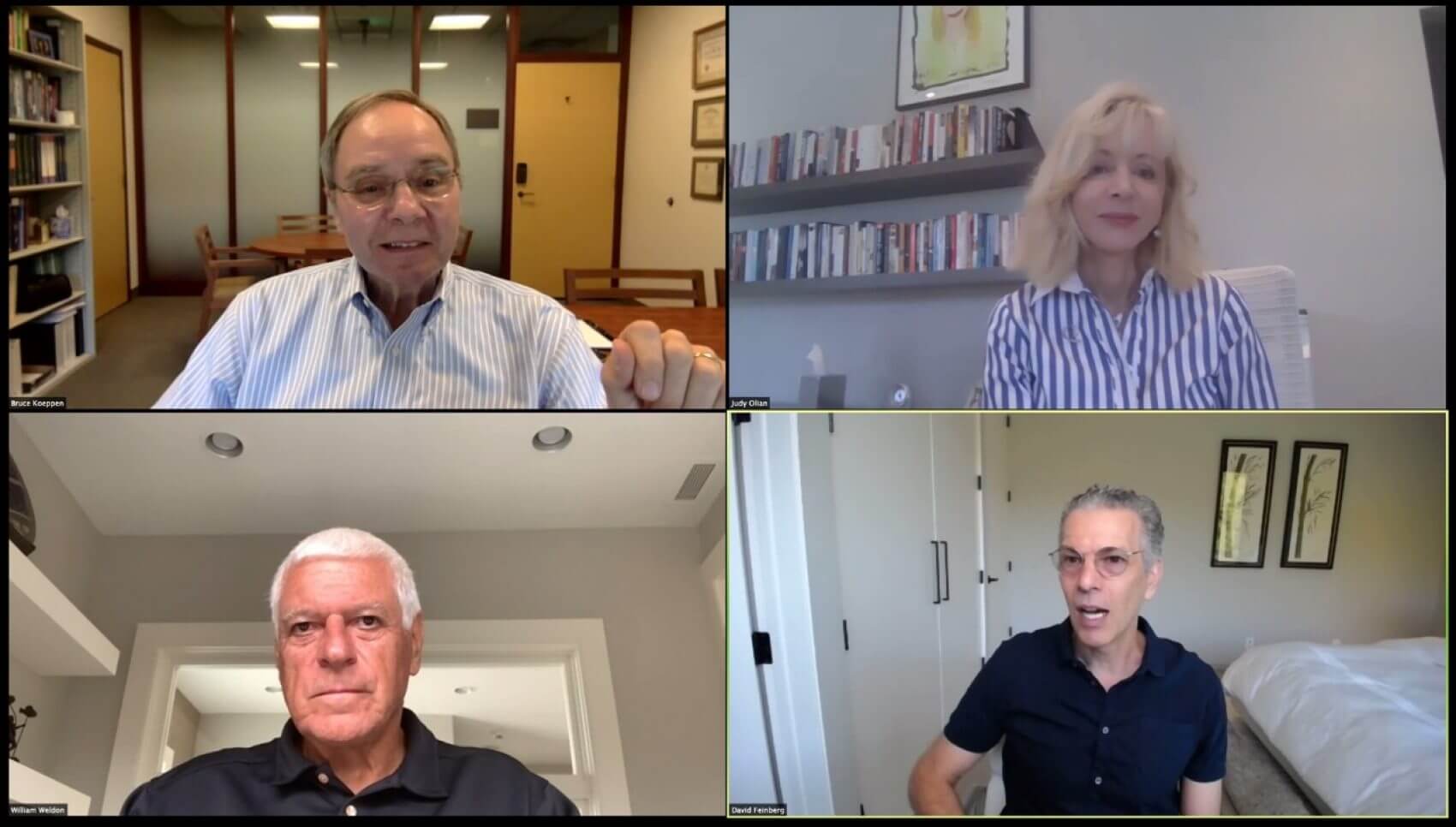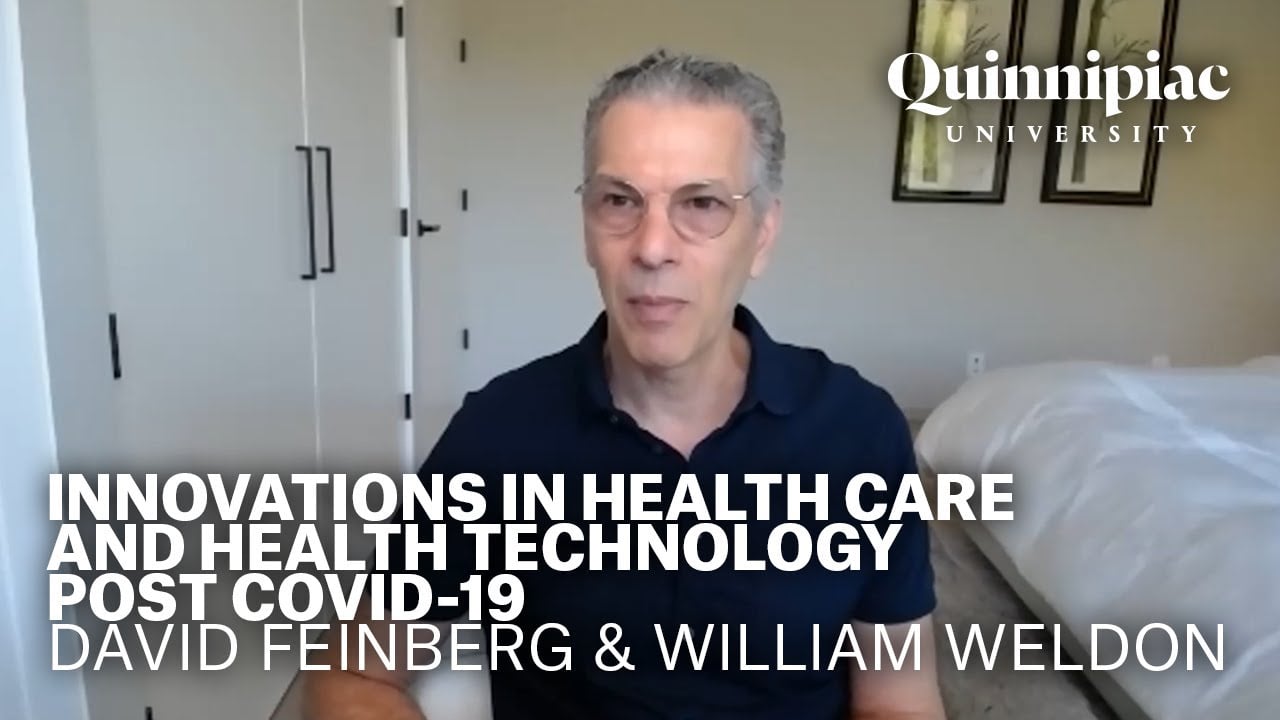
Corporations, industries collaborating to find testing, treatment for COVID-19, experts say in virtual discussion
July 10, 2020

July 10, 2020

“I think they’re improving tests as they go,” said William Weldon ‘71, former chairman and CEO of Johnson & Johnson, and a member of several boards of directors including Quinnipiac and CVS. “The tests are coming along quickly. I think the more pressing question is access to them.” Watch the full recap
Although he described the testing as coming along “rapidly,” he said the bigger challenge is the lag time between learning results and — the biggest challenge — development and distribution of a vaccine.
“I think there's like 120 companies that are working on vaccines today — and I think most of them are actually rooting for each other because no one company is going to be able to satisfy the international need for vaccines,” he said. "The big challenge is going to be getting them approved… I don't see a vaccine, personally, until early next year or the middle of next year, and especially at the volume that is going to be necessary because manufacturing is going to be the limiting factor.”
He said he anticipates a vaccine that looks promising toward the end of this year, but it wouldn’t be until the beginning or middle of next year before one becomes available to the general public.
Dr. David Feinberg, vice president of Google Health, agreed, adding that being able to create a vaccine available across the country and worldwide is “going to take a lot of really thoughtful clinical trials.”
Google is focused on providing a place to get accurate, up-to-date information, he said.
“We're really, really focused on providing authoritative information,” Feinberg said. “We want to make sure that misinformation, which we battle on anti-vaccine issues, doesn't get hold here so that people get the right information, and can make the right decision with their health care provider about whether a vaccine is appropriate for them or their family or their loved ones.”
Google, in partnership with Apple, has created a tool for contact tracing called Exposure Notifications.
“Traditional methods of contact tracing are critical to containing the spread of infection,” the site explains. “Technology can support and augment these efforts by allowing public health authorities to quickly notify people who may have been exposed to a person who has contracted COVID-19, including those the person might not know directly. This starts with Exposure Notifications on your smartphone, which enable contact tracing apps to send you a notification if you’ve likely been exposed to COVID-19. Contact tracing apps will be developed by your local public health authority, not by Google or Apple.”
Technology companies are also transforming the way they harness technology to benefit society, Feinberg explained.
“When this pandemic broke, for the first time ever, Google created an SOS page that had something to do with a medical condition,” Feinberg said. “We’ve done them previously for natural disasters, but this is the first time we did a medical SOS page. And what that means is if you typed in google.com/covid or anything around coronavirus, you got to a page that was completely curated by authoritative information, local public health, national, WHO and the CDC.”
The technology giant shaped the information it provided based on advanced analysis of the terms people used in their searches.
"What we saw over time was it went from information about the disorder to a lot of mental health issues. We saw a lot of searches for anxiety and depression,” he said. "So we launched an anxiety screener online. If you were to Google ‘anxiety' or 'anxiety disorder,' you could take a self-assessment of where you are on a spectrum of anxiety disorders. We previously had done that for depression and post-traumatic stress disorder. What we saw and what the data told us was that those suffering from depression, anxiety, diseases of despair like suicide, substance abuse, alcoholism, really increase in times like this — when the economy gets bad, when social distancing leads to social isolation, and when you’re stressed because of work and food and toilet paper and being at home and not being with loved ones.”
He said that, on average, before the pandemic, people would wait seven years before they would share a mental health disorder with a loved one. To help start the conversation, Google wanted to use its platform to help users get treatment.
Feinberg said there has been a dramatic uptick in telehealth and virtual care. “What we tried to do through Maps and other tools that we have was to make it really easy for people to access that care.”
Weldon echoed Feinberg, explaining that in the first six months of 2020, CVS provided 20 times the amount of telemedicine visits than they had in all of 2019. And the need for telehealth and the technology involved is only improving.
“I think that there's going to be a huge change in the future of medicine in the way it is handled,” he predicted.
The COVID-19 pandemic has shone a bright light on health inequality throughout the United States.
“Health inequities among people of color and low socioeconomic status are such that you can live a few miles apart and could go to the same doctors in the same hospitals in your city as your neighbor who lives a couple miles apart and have life expectancy differences of 20 to 25 years. It's driven not by bad doctoring and bad hospitals and bad nurses or good health care,” Feinberg said. "It’s driven by the other stuff — access to food, safe neighborhoods, transportation, chronic stress. Really the diseases, the despair that definitely affect those communities at a higher rate. Racism is a health care issue.”
Feinberg said a lot of work is needed to be done, and compared our nation’s mindset to that of a century ago.
“Public health in America has been historically underfunded and yet you see how important it is,” he said. "I was reading a paper — I think it was from about 100 years ago exactly — about the Spanish flu. The advice in there with the same advice we're giving now and it's almost like we haven't learned.”
He stressed working together and doing things like wearing a mask when in public areas.
“We’re in this one together,” Feinberg said. “If we don't get this right, it has so many consequences beyond the medical sequelae of people dying and the morbidities associated with it and the mental health issues. There's are also all the economic issues. And so these two go together.”
Weldon warned that we still may not fully understand the longer-term effects of those who have been exposed to COVID-19 — but that technology may be able to assist us.
“Artificial intelligence is going to be critical to the future,” he said. “I think that AI is going to continue to advance medicine in ways that it's never been advanced before.”
To that end, Weldon called for uniformity among medical records.
“We need to have a standardized format,” he said. “Electronic medical records are going to give you the ability to go anyplace, anywhere and know all of the issues that you have and everything that’s going to go to move it forward. So I think that the first step is to get some type of standardized form that — whether you’re in Lake Oswego, Oregon, or LA or Connecticut — when you go into an urgent care, give a card to somebody, they can put it on and they can see all the products you are on, all the issues you have, and everything else so then they will be able to treat you appropriately.”

Quinnipiac Today is your source for what's happening throughout #BobcatNation. Sign up for our weekly email newsletter to be among the first to know about news, events and members of our Bobcat family who are making a positive difference in our world.
Sign Up Now